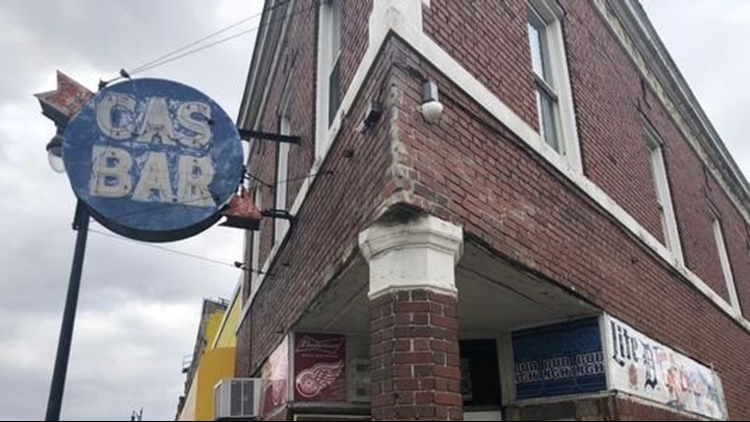DETROIT — At the corner of Michigan Avenue and Casper Street on Detroit's west side, Cas Bar has been known for decades as a total dive — if you knew it at all.
A tattered blue sign was the only real clue to its existence, alongside the beer ads wrapped around the brick storefront. Inside, bikers, working girls, old-timers with no other social life, hipsters and the three-toothed man who had lived down the street for 30 years lined the counter for Corona or Bud Light.

Beverly Jo 'Mama Jo' Sassin, 70. (Photo: Dearborn Police Dept.)
Bartender Beverly Jo "Mama Jo" Sassin, 70, served in style: a “Golden Girls” pixie haircut, rotating floral tops and gold hoop earrings. You accepted her homemade cookies and advice, but if she told you to get out, you got out. "Drug dealers were scared of her," said one former patron.
Her daughter, Amanda Mosed, stood by as a treasured deputy. Former wild-teen-turned mom, she was now 38 and a registered nurse who cared for patients when not slinging drinks.
Those not-so-quiet days are finished. Both Sassin and Mosed, along with two others associated with the bar, are the latest accused of a crime that sounds more glamorous than Cas Bar ever was: a retail fraud ring.

Amanda Lynn Mosed. (Photo: Dearborn Police Dept.)
For years, prosecutors say, they've resold things like guns, televisions, washing machines and energy drinks out of the crumbling dive. And while the women themselves are a study in contrasts, their alleged way of operating was one small part of a blossoming American industry that preys on drug addicts and hemorrhages billions of dollars each year.
The hoard in the basement
Sassin and Mosed walked into the Dearborn District Court on Dec. 7 surrounded by a gaggle of supporters. Both mother and daughter are tall, white women, with long faces and high-arched brows. Sassin wore a black floral top and purple-rimmed glasses; Mosed, clad in red leggings, let her long hair flow down her back.
They had been released on $100,000 bail just a week earlier. Across the room sat the other two defendants, Christopher Bucannion, 45, of New Boston, and Jodi Beth Welbes, 49, of Lincoln Park, looking a little tired.
Cas Bar is in Detroit, while Sassin and Mosed live in the metro Detroit suburb of New Boston. But this really all started in the city of Dearborn, when police caught a man stealing from a liquor store, said police chief Ronald Haddad.
The thief planned to "fence" the goods at Cas, he told Dearborn Police. That spurred the beginning of an investigation, and by Nov. 26., police had raided several locations for stolen property and soon arrested four suspects.
In the bar's basement, police found enough property to fulfill a hoarder’s dreams: $600,000 in cash, coffee, faucets, air freshener, a washing machine. And that "barely scratched the surface" of the property police uncovered between the raids, Haddad said.
Prosecutors allege that the foursome paid local heroin addicts to steal from places like Target, Kroger and Meijer. Each faces six counts related to the case, including conducting a criminal enterprise, conspiracy to commit organized retail crime and concealing property. Bucannion also has two more felony firearm possession charges.
But the Dec. 7 conference would need to be rescheduled. Wayne County Assistant Prosecutor Fadwa Hammoud explained to the judge that Cas Bar was "a little more detailed than the average case coming through." In other words, the county had an extensive amount of discovery to deal with.
Sassin and Mosed headed outside to chat with their friends, Mosed murmuring at one point to stay quiet, because a reporter was nearby. Already they had received coverage from national outlets like the New York Times and Newsweek.
It made for an intriguing, if not almost unbelievable, tale.
“The visuals — when you have firearms, expensive liquor, cash out on the table, and you’re talking about the fraud ring — it seems like a higher-end crime,” said Robert Moraca, vice president of loss prevention at the National Retail Federation (NRF). "You're going to stay tuned in."
'One of the hardest things to fight'
Although selling goods out of a dive bar may appear old-fashioned, it’s actually a back-to-the-future twist on typical retail fraud.
Now that investigators have cracked bigger platforms like eBay, retail fraud organizers have gone back to fencing items off of trucks, to their neighbors and out of bars. They've also moved operations to newer sites like Facebook Marketplace and OfferUp.
"It's more decentralized, and it's harder for law enforcement to track their goods because now they're going to these smaller neighborhood or community outlets," Moraca said.
On Facebook posts after the Cas Bar foursome was arrested, locals asked for a definition of “Instant Pots" ("They're like an awesome crockpot," explained one user) and joked about the seeming absurdity of a 70-year-old woman allegedly running a crime ring.
But mostly, people wanted to know how they could have pulled it off.
Many ways, said Sgt. Meghan Lehman of the Troy Police Department in Oakland County. With two malls in Troy's limits, including the high-end Somerset Collection, plus chains like Walmart and Kohl's, retail fraud counts as the area's most common crime.
A classic tactic is the "pushout," like the couple earlier this month that loaded two TVs in a cart at a local Walmart, ran outside, and got caught stuffing the goods in their truck. Other thieves conceal items in a stroller alongside a child.
Sophisticated boosters, meanwhile, use credit card fraud to buy bigger things like electronics or even refrigerators.
"It’s one of the hardest things to fight for us," Lehman said. "A lot of times, people are not caught right away."
Nationally, organized retail crime is at an all-time high, according to the NRF. The crime costs businesses about $30 billion each year, said the FBI — roughly equivalent to the entire state of Vermont's GDP.
More and more of initial theft happens online as boosters take advantage of technology meant to make consumers' lives easier, Moraca said.
Yet, no matter the tactic, there's an obvious underpinning: addiction. In Wayne County, prosecutor Hammoud estimated that well over 80 percent of boosters struggle with drug addiction, usually heroin.
"These fencers are creating a market for our drug problem and creating a way for our boosters to fuel their addiction," Hammoud said.
Businesses that fence stolen goods are "absolutely" exploiting addiction, she said. When addicts reach the brink of homelessness and have little access to services, they're willing to steal goods in exchange for just cents on the dollar.
Over the last year and a half, her office has prosecuted over 70 organized retail fraud cases, and in October established a unit specifically dedicated to business protection. Hammoud envisions a system that rehabilitates boosters and punishes the fencers that take advantage of them.
Lehman put it more simply.
"Any cop will tell you, it’s heroin users that are typically the ones doing this," Lehman said.
From suburbia to Detroit bar owner
Out on the dirt roads of New Boston, past the airport on I-94 and billboards for Culver's, cheap lake houses and Jesus, you'll hit a row of houses tucked across from a railroad line. Pickups in the front, trailers in the back: Here live the Sassins.
Their house sticks out for its size — two stories, and expansive — and the five different vehicles out front, including a truck, a station wagon, and an SUV. It's not a chatty road, said a neighbor who opened his door one Sunday in December. They haven't had trick-or-treaters for about eight years.
But he has always noticed the unusual volume of cars that come and go from the Sassins' house every night since they moved in a few years ago. And he watched police raid the house in late November, just like he saw our car slowly driving past, twice, before we stopped to knock on doors.
Detroit Metro Airport is just a 10-minute drive away. But it feels rural out here. Down the road, an abandoned toilet sits on dying grass, a potted plant nestled inside.
Sassin grew up in metro Detroit in places not unlike this one, namely Oakland County, she once told the Detroit Metro Times. She married the late businessman Mike Sassin and bought Cas Bar as a favor to a family friend over 20 years ago.

An old toilet off the road in New Boston, where the Sassins live. (Photo: Fiona Kelliher)
They raised Amanda in White Lake, according to longtime regular Samantha Moody, 41. The girls knew of each other when they took horse riding lessons at Haverhill Farms, and later reconnected when Moody frequented Cas with a boyfriend who was a cop based out of Cas’ precinct.
In her 20 years drinking vodka cranberries and Patron tequila at the bar, Moody always thought Mama Jo was much smarter than her self-described hillbilly persona. And Mosed was super-shrewd and "a little hood," Moody said.
"A good mom, a good bartender, a lot of fun to go out with," Moody said of Mosed. "So it’s very weird to hear this stuff about her."
Amanda married Fadhl Mosed, 43, in 2001, after their son, Jayzon, was born in 2000. They divorced after just five months. In divorce-related documents over the years, Fadhl Mosed was listed as unemployed; once he wrote that he worked at a plastics packaging facility in Westland.
Jayzon split time between his parents, but mostly lived with Amanda. When he was 13, he was shot in the head while visiting his father’s native Yemen during a feud between families.

Amanda Mosed, of Dearborn Heights and her ex-husband Fadhl Mosed, of Detroit, look at photos of their 13-year-old son Jayzon who was shot to death during a visit with family to Yemen in October 2014. (Photo: Mandi Wright, Detroit Free Press)
"The kid has the biggest heart you've ever seen in your life," Amanda Mosed told the Free Press at the time.
He died in Yemen about six weeks after the shooting.
That changed Amanda, Moody said, as it would anyone. As recently as November, Amanda Mosed posted a photo of Jayzon and her two younger children on Facebook for what would have been his 18th birthday: "Forever & always must I love you my son!!!" she wrote.
Mostly, though, international tragedies didn't dominate the conversation at Cas Bar. You'd show up, grab a beer or a shot, people-watch. It was a come-as-you-are place. On the counter sat a donation jar for someone who’d lost their job, or needed help with cancer treatment.
Sure, people came in off the street to sell things they’d stolen. Deodorant, nail polish, the occasional lawn ornament. But Moody, for one, had seen that at other bars, and in all her years at Cas, she never witnessed behavior from the bartenders that indicated they were involved.
"You’d think something would have come up,” Moody said.
A 'chaotic' Michigan Avenue scene
Around the time that Sassin bought Cas Bar, the surrounding strip between Michigan-Martin and Dearborn was home to a number of now-defunct bars like Kress Lounge. Red's Park-Inn still lives on a few blocks away.
Today, nearby business owners drive home before dark, said Joe Bozich, the mustachioed man who owns Junque Shop Antiques across the street. He'd always thought of Cas as a biker bar, often with a bit of a rough crowd, Bozich said one December afternoon as he cleaned knickknacks under a magnifying glass.
"Activity doesn't really start until 3 on Michigan Avenue. That's why we close at 3. We get enough of that already," added his nephew, John Bozich, jerking a thumb at the homeless man who had just left the store.
Cas certainly mirrored the neighborhood in being "chaotic all the time," said a resident in her 40s who has lived near the bar for several years. It had a real homegrown feel, with a number of ex-cops that drank there every night. Plus the working girls were known to use the apartments upstairs for customers, she said.
Sometimes, moving trucks showed up around 5 or 6 a.m. in the bar's back parking lot, according to the resident. She figured the drivers were getting serviced by prostitutes or that they'd gotten delivery times wrong.
"Looking back, we're like, 'Oh. Oh,' " she said.
Cas was cited just three times over the years by the Michigan Liquor Control Commission, once in 2014 for impeding officers from inspecting the bar and allowing non-staff to remain inside after hours. Officers completed the inspection after about 20 minutes of waiting outside, according to a report, and fined the bar.
For some patrons, hints of something strange at Cas Bar cropped up years ago.
Vas Jacobs, 38, of Detroit walked into the dive with a friend in 2003 and felt heads swivel toward him. Middle-aged men crowded around tables shoulder-to-shoulder, one particularly drunk and sorrowful guy sitting alone at the bar.
Sassin was at the counter, and behind her hung a dress dotted with bows. She was trying to get rid of it, Jacobs said she told him, which he took to mean selling it.
Then a couple guys came in carrying trash bags of clothing. Sassin took a look inside the bags and chatted with the men for a few minutes.
“I remember her saying, ‘Those guys boosted those clothes from a truck,’ and I was like ‘Boosted, wow, I’ve never heard a 60-something woman say boosted,’ ” Jacobs said. “Like, there was a level of comfort there."
To her credit, Jacobs said, Sassin didn’t buy the goods, and the men went on their way. But Jacobs immediately remembered the incident when he saw reports of Sassin’s arrest this fall. He hadn't been back to Cas since the mid-2000s.
“I was like, holy shit — I knew that was the case at the bar,” Jacobs said.
Others never gave the bar a second thought. Ely Hydes, 33, hung out at the bar five or six times back in 2010 or so when he frequented Papa’s Pizza down the street. He’d grab a Miller Lite and practice his Spanish with some of the older patrons who were native speakers.
The cleanliness of the place wasn’t totally up to snuff, Hydes said, and there usually were about three beers on tap. But he liked it for those same reasons.
"It was definitely just a complete shithole," Hydes said. "It was a total dive."
Shortly before Sassin and Mosed were arrested in November, Samantha Moody stopped by Cas Bar to say hi while visiting the city for a Red Wings game.
It's not clear exactly what the court will reveal over the coming months, or how defendants will combat the allegations. Hammoud declined to discuss specifics about the case, while a lawyer for Sassin and Mosed declined to comment. Lawyers for Welbes and Bucannion did not respond.
But that day felt like old times, even though Moody hadn't been back to the bar for about a year. It's a far drive from where she works as a riding instructor out in Mount Morris now, and she no longer drinks vodka cranberries, either; she doesn't like the hangovers.
Mama Jo wasn't there. Moody sipped a beer, feeling what she's always felt about Cas Bar.
"Not one thing has changed," Moody said.
Fiona Kelliher is a former Detroit Free Press intern. Follow her on Twitter: @fiona_kelliher.
►Make it easy to keep up to date with more stories like this. Download the 13 ON YOUR SIDE app now.
Have a news tip? Email news@wzzm13.com, visit our Facebook page or Twitter.



